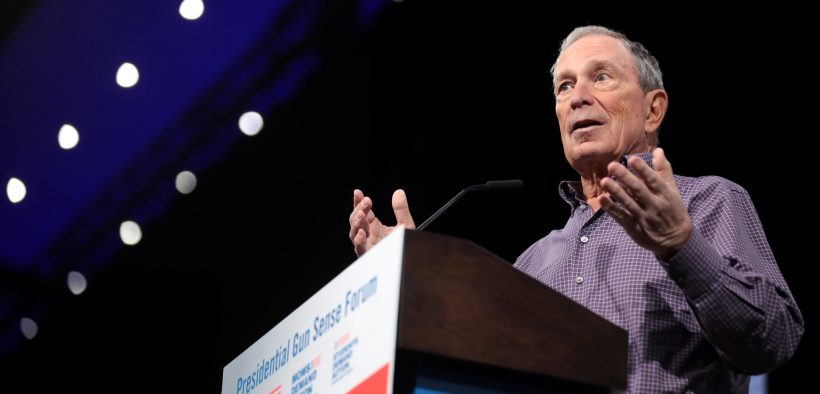Sorry, Progressives, Bloomberg’s Candidacy Is Good for America

As Bloomberg’s spending mounts, accusations by Senators Warren and Sanders that he is “buying” the election grow more hysterical. And they are wrong. Bloomberg’s campaign is good for America and good for democracy. Here’s why.
Like it or not, America embraces money in politics. We could prohibit lobbying, but we don’t, and there are more lobbyists in Washington than there are members of Congress. Anyone with money has influence, be it labor unions, pharmaceutical companies, the AMA, farmers, the American Bar Association, or the US Chamber of Commerce.
We could remove money from elections by publicly funding them as other countries do, but we choose not to. Running for office in America is first a financial challenge, and the inability to raise money often is the first cause of candidates failing to get out of Iowa or New Hampshire.
Money is everywhere. We award ambassadorships to large donors. Wealthy donors sleep in the Lincoln Bedroom. Former presidents make millions in speaking fees. The revolving door between industry, senior administration positions, and K Street is lucrative and turns rapidly.
While it is a tradition to protest this condition relentlessly, the fact is we do nothing. Somehow, we accept it. We may think we are better than this, but this is indeed who we are. Senators Warren and Sanders, as longstanding members of Congress, are part of this reality. Why then all the false outrage about Bloomberg’s money?
We should welcome as many voices as possible to the political process. I welcome the increase in choices that the Bloomberg candidacy brings. I am under no obligation to vote for him. The choice is mine. My vote is not for sale. The accusation that it is for sale is insulting to the intelligence of the American voter.
We should also welcome a voice in the political process that is truly independent and whose candidacy is not indebted to anyone. In an environment so entirely corrupted by money, why would we not welcome a voice that is not so corrupted?
Then of course there is the inherent bias against billionaires exhibited by the senators. Consider the statement made in the Wednesday debate by Senator Warren: “Democrats make a huge mistake if they substitute one arrogant billionaire for another.” Meanwhile, Sanders doubled down on his view that billionaires should not exist, and that great wealth is “immoral.”
Consider the childishness and simple absurdity of this argument. First, it is inherently prejudicial and bigoted. Billionaires are not a unified class with unified interests. Surveys show that they vote and line up politically roughly according to the same distribution as all Americans. Secondly, consider a world in which anyone successful enough to become a billionaire would be automatically excluded from participating in public policy—a world in which the talents of some of the most innovative, industrious, and risk-taking Americans are redlined. Good luck with that.
Last time I looked, government was hardly a hotbed of innovation. Without innovation we will be unable to address the increasingly pressing problems of our time. Perhaps the senators should recognize that everyone, even billionaires, has something to contribute and judge them based on their merits, rather than summarily dismiss them with the flourish of childish labels. Name calling and prejudice should be left on the playground and not be part of a presidential campaign.








While you make a valid point for your argument that Bloomberg’s candidacy is good for America such as welcoming as many voices to the political process as possible, the comment “We should also welcome a voice in the political process that is truly independent and whose candidacy is not indebted to anyone.” is misleading as Bloomberg has never displayed any altruistic purposes in his political career. His interests appear to be self-aggrandizing and supportive of his infamous misogynist attitude toward women and racist attitude toward POC.
His sudden decision to join the stage further appears to be driven by his fear of seeing a Sanders presidency where people in his massively wealthy class will be required to pay their fair share of the tax burden rather than skirting the edges as they have done for decades. You mentioned that “Billionaires are not a unified class with unified interests.” which, when considering the fact that Sanders has steadfastly stated his position regarding the wealthy, taxes, healthcare, education, etc., is a threat to their entire class. A good example of this is to ask, ‘how many millionaires in Congress, both Democrat and Republican, voted for the huge increases in the military budget?’ And then ask, ‘how many non-millionaires who do not have MIC related organizations in their constituencies voted for the same increases?’ I’ll let you do the reporting on that.
Bloomberg is a spoiler, a distraction for the politically unaware. He’s dangerous for democracy. He doesn’t care if our social programs are adequately funded or not, if we have healthcare for people who have none, if we have adequate education opportunities. His tenure as mayor of the world’s leading city proves these points. He could have accomplished so much during that time but he chose not to not because it was difficult to achieve, but because he placed the wealthy class above the working people.
Being a billionaire is evidence enough that he doesn’t play well with his classmates. Not seeing this one, glaring point with regard to Bloomberg and whether or not he would make a horrible president is the definition of being politically unaware.
Well said.
Thank you William for your engagement and thoughts. While the intention of my piece was not to opine on the merits of a Bloomberg candidacy, only on the value of additional voices in the process, I do have a more charitable view of his candidacy than you do. Having lived in NYC during his tenure as mayor, I thought he was good for the city. He actually raised property taxes on wealthy homeowners in order to fund the city post 9/11. I also view his financial support of democrats during that past few years and considerable philanthropic engagement more charitably than you do. As for your view that the billionaire class is monolithic in nature, I actually observe many high profile members of that class calling for higher taxes, including Bill Gates, Warren Buffet, Jamie Dimon, and Mayor Bloomberg himself. (He simply opposes the wealth tax based on the view that it is unconstitutional.)
Neither half of the “duopoly” is capable of fielding a truly good presidential (or senatorial, or representive) candidate; they are both long since reduced to special-interest conglomerates, and the same most-powerful special interests — namely, the military-industrial complex and the Jewish lobby — essentially control both parties. The evidence is plain to see, every day, everywhere.